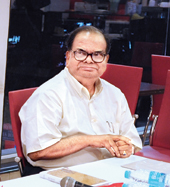 |
 |
| Sankar at the launch of his book The Great Unknown at Crossword and (below) a portrait of Rabindranath Tagore by Ranen Ayan Dutt. Picture by Pradip Sanyal |
In College Street, book launches were looked upon with suspicion. I wonder why my Bengali publishers never launched my original works the way their English translations are being launched now. I regret it,” said author Sankar at the launch of The Great Unknown, the English translation of his debut novel Koto Ajanarey.
The launch of the English version — translated by UK resident Soma Das and published by Penguin — saw an interesting guest list at Crossword, Elgin Road, on Thursday.
Hindustani classical vocalist Pandit Ajoy Chakraborty sang a beautiful sloka to wish Sankar and his book luck, while Chittatosh Mukherjee, a former chief justice of Mumbai and Calcutta high courts, said he was happy with the translation, except that the first letters of “high court” should have been in upper case!
“The Great Unknown could not be better timed. In the run-up to Calcutta High Court’s 150th anniversary in 2012, non-Bengali readers can now get a glimpse of Calcutta in the ’50s and its court life. Sankar has dished out the innards of life in the high court and its various chambers,” added Mukherjee.
Novelist Rimi B. Chatterjee read portions from the book, narrating the bitter love story of Surojit Ray and Anglo Indian typist Helen Grubert.
Sankar opened his talk with: “Never ask an author to talk about his first book. He can get too garrulous.” The audience burst out laughing.
Peppered with quips and his unique quirks, Sankar recounted his struggle to measure up to the expectations of his mother, who wanted him to be like Sir Asutosh Mukherjee, the first Indian vice-chancellor of Calcutta University.
“But unlike Sir Asutosh, I was miserable at math. I turned out to be equally awful in painting and cut a sorry figure in music too! So I had no clue how I could ever be as famous as him,” laughed the author, with Sir Asutosh’s grandson Justice Chittatosh joining in.
Sankar’s mother may have given up hope as he grew up, but British barrister Noel Frederick Barwell, under whom the author worked as a clerk in Temple Chambers, never lost faith in the author’s capabilities. Barwell’s sudden death prompted Sankar to pen Koto Ajanare, and thus started his literary career.
“When I had left the manuscript with the publisher, he had asked me not to disturb him for three months. Next time I contacted him he treated me to coffee and said I was the first writer who had not left his contact details on the manuscript. So I could not be informed that it had been accepted,” said Sankar, with a laugh.
“Now after six decades I am enjoying my book’s formal launch,” he added to an audience, which was enjoying the “garrulous” writer’s account to the hilt.
Writings old and new
Few venues for a book release could have been as beautiful as the western quadrangle of the Victoria Memorial Hall, particularly when the evening was relatively cool on April 16, and the moon gradually emerged from behind the huge dome of the monument. This was where Marg’s book to commemorate the 150th birth anniversary of Rabindranath, titled Something Old, Something New, Rabindranath Tagore 150th Birth Anniversary Volume was released by retired judge, Chittatosh Mukherjee, a man of few words.
Introducing the book, Pratapaditya Pal, the general editor of Marg, the magazine founded in 1946 by Mulk Raj Anand, in a light vein pleaded with the gathering to keep aside some cash for the book instead of splurging it on India’s twin obsessions — cricket and Bollywood. He said the book is a compilation of writings both from the past and the present.
The profusely illustrated volume contains valuable writings by Mulk Raj Anand on Rabindranath’s paintings published 50 years ago on the occasion of the poet’s birth centenary, and Santideb Ghosh’s piece on Tagore’s presentation of Manipuri dance at a time when few were aware of the dance form. He, however, made clear that it was targeted at non-Bengali readers and others who do not understand Bengali.
Sabyasachi Bhattachrya, the chairman of the Indian Council of Historical Research, New Delhi, spoke of the “international” nature of the Santiniketan experiment — in other words Visva-Bharati. Tagore was close to the students and wrote poems for them. He recited one with “curious rhyming” in the original Bengali, and later explained it in English. Commenting on the exhibition of photographs of Santiniketan taken in 1929 by Emil Otto Hoppe, that was inaugurated later, he said it did not contain any photographs of performances held in Santiniketan, although the play Tapati had been staged then. A catalogue of the exhibition was released.











